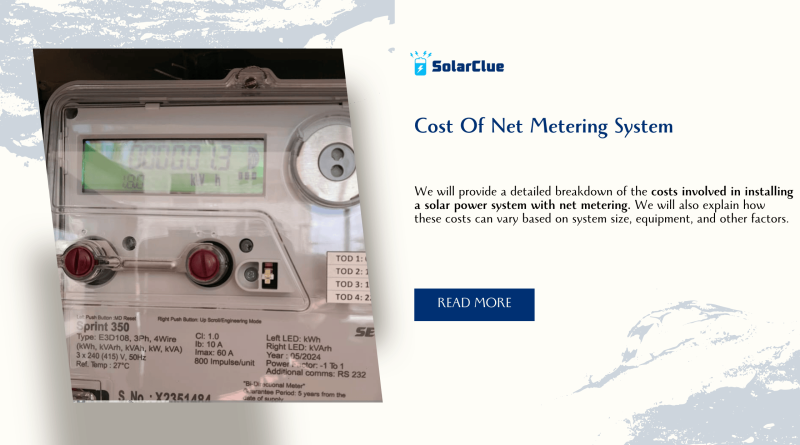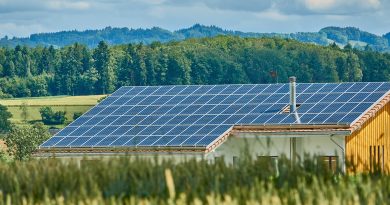Cost Of Net Metering System
With the increasing adoption of renewable energy, particularly solar power, more households and businesses are considering net metering systems in India. A net metering system allows consumers to generate their own electricity (usually via solar panels), export excess energy to the grid, and receive credits that reduce their electricity bills. However, one of the most common questions is: What is the cost of setting up a net metering system in India?
In this blog, we will provide a detailed breakdown of the costs involved in installing a solar power system with net metering. We will also explain how these costs can vary based on system size, equipment, and other factors.
Table of Contents
- 1 Components of a Net Metering System
- 1.1 1. Solar Panels
- 1.2 2. Inverter
- 1.3 3. Bi-Directional Meter
- 1.4 4. Mounting Structure
- 1.5 5. Wiring and Cabling
- 1.6 6. Installation and Labor Costs
- 1.7 Explanation of Costs
- 1.8 Government Subsidies and Financial Assistance
- 1.9 Example:
- 1.10 Other Factors Influencing Cost
- 1.11 1. Location
- 1.12 2. Quality of Components
- 1.13 3. Type of Installation
Components of a Net Metering System
A net metering system primarily consists of a solar power generation system, along with the necessary equipment for grid connectivity. The major cost components include:
1. Solar Panels
Solar panels are the most important and costliest component of a net metering system. Their cost depends on factors like efficiency, wattage, and the brand. In India, typical solar panel prices range between ₹25 to ₹40 per watt.
2. Inverter
The inverter converts the Direct Current (DC) produced by the solar panels into Alternating Current (AC), which is used by electrical appliances. Inverters are essential for both self-consumption and grid export. Prices for inverters range from ₹6,000 to ₹12,000 per kW, depending on the technology and brand.
3. Bi-Directional Meter
A bi-directional meter records both the energy consumed from the grid and the energy exported to the grid. This is essential for billing purposes in net metering systems. The cost of a bi-directional meter is approximately ₹5,000 to ₹10,000.
4. Mounting Structure
The mounting structure is used to hold the solar panels in place. The cost varies based on the type of roof, material used, and the number of panels being installed. Generally, this can cost ₹1,500 to ₹3,000 per kW.
5. Wiring and Cabling
Wires and cables are required to connect the solar panels, inverters, and the main electricity supply. The cost of wiring is typically ₹20 to ₹40 per meter, depending on the quality and type of wiring required.
6. Installation and Labor Costs
The cost of installation, including labor and technical services, usually accounts for 10-15% of the total system cost. For a typical system, this can range from ₹5,000 to ₹15,000, depending on the complexity and size of the system.
Total Cost of Net Metering System in India
The total cost of setting up a net metering system depends on the size of the system (measured in kW) and the quality of the equipment used. Below is a table providing a breakdown of the estimated costs for a typical 1 kW, 3 kW, and 5 kW solar system in India.
Estimated Cost of Net Metering System in India (by System Size)
| Component | 1 kW System | 3 kW System | 5 kW System |
|---|---|---|---|
| Solar Panels | ₹25,000 – ₹40,000 | ₹75,000 – ₹1,20,000 | ₹1,25,000 – ₹2,00,000 |
| Inverter | ₹6,000 – ₹12,000 | ₹18,000 – ₹36,000 | ₹30,000 – ₹60,000 |
| Bi-Directional Meter | ₹5,000 – ₹10,000 | ₹5,000 – ₹10,000 | ₹5,000 – ₹10,000 |
| Mounting Structure | ₹1,500 – ₹3,000 | ₹4,500 – ₹9,000 | ₹7,500 – ₹15,000 |
| Wiring and Cabling | ₹2,000 – ₹4,000 | ₹6,000 – ₹12,000 | ₹10,000 – ₹20,000 |
| Installation and Labor | ₹5,000 – ₹8,000 | ₹10,000 – ₹15,000 | ₹15,000 – ₹25,000 |
| Total Estimated Cost | ₹44,500 – ₹77,000 | ₹1,18,500 – ₹2,02,000 | ₹1,92,500 – ₹3,30,000 |
Explanation of Costs
- 1 kW System: Suitable for small households with minimal electricity consumption (3-4 units per day). The estimated cost ranges from ₹44,500 to ₹77,000.
- 3 kW System: Ideal for medium-sized households or small businesses (10-12 units per day). The cost ranges from ₹1,18,500 to ₹2,02,000.
- 5 kW System: Best for larger households or commercial establishments (15-20 units per day). The cost ranges from ₹1,92,500 to ₹3,30,000.
Government Subsidies and Financial Assistance
The Ministry of New and Renewable Energy (MNRE) in India provides subsidies and incentives for installing rooftop solar systems. Under the Rooftop Solar Power Scheme, consumers can avail subsidies of up to 40% for systems up to 3 kW and 20% for systems between 3 kW and 10 kW.
Example:
- For a 3 kW system priced at ₹1,80,000, a subsidy of 40% would reduce the cost by ₹72,000, bringing the total to ₹1,08,000.
- For a 5 kW system priced at ₹3,00,000, a 20% subsidy would reduce the cost by ₹60,000, making the final price ₹2,40,000.
Other Factors Influencing Cost
1. Location
Costs can vary depending on your location in India. Areas with higher solar insolation (like Rajasthan or Gujarat) may require fewer panels for the same output compared to areas with lower solar insolation (like Northeastern states).
2. Quality of Components
High-efficiency panels and inverters may come at a higher cost, but they provide greater long-term savings by producing more energy over their lifetime.
3. Type of Installation
Ground-mounted installations are typically more expensive than rooftop installations due to the additional infrastructure required. Similarly, installing on a slanted roof may incur additional labor charges.
Conclusion
The cost of a net metering system in India depends on the system size, the quality of the components, and location. However, with government subsidies and long-term energy savings, the investment in solar can quickly pay off. Whether you are looking to power your home, business, or industrial facility, net metering offers a practical and eco-friendly solution to rising electricity costs and environmental concerns.
Ready to Save on Electricity Bills with Solar Power?
With Net Metering, you can drastically reduce your electricity costs by generating your own solar power and sending any excess back to the grid. It’s time to harness the sun’s energy and make a positive impact on both your wallet and the environment!
At SolarClue, we make the transition to solar simple, efficient, and affordable. Whether you’re a homeowner, business, or institution, our team of solar experts will guide you through the process—from installation to maintenance—so you can start saving from day one.
🌞 Take the first step towards energy independence today!
🔋 Get your solar consultation now!
Contact SolarClue or call us at +91-888-4444-830 to explore the best solar solutions for your home or business.
Go Solar. Save More. Power Your Future with SolarClue!
FAQs
1. What is the average payback period for a net metering system?
The payback period typically ranges from 5 to 8 years, depending on system size, energy savings, and government subsidies.
2. Is net metering available across India?
Yes, net metering policies are available in most Indian states, but regulations and subsidy schemes may vary.
3. Do I need approval from my electricity provider for net metering?
Yes, approval from your electricity distribution company is required to connect your solar system to the grid.
4. How much maintenance does a solar system require?
Solar systems require minimal maintenance, usually only periodic cleaning and occasional inspections to ensure optimal performance.
5. Can businesses also benefit from net metering?
Yes, commercial and industrial entities can also benefit from net metering, especially with large rooftop spaces for solar panels.




